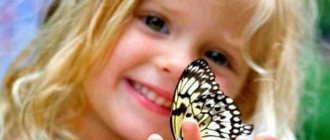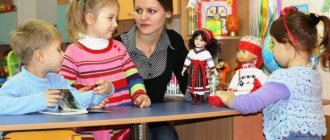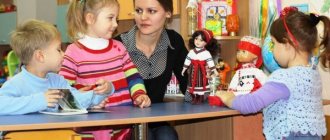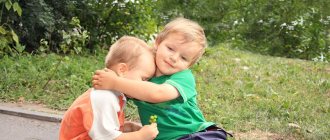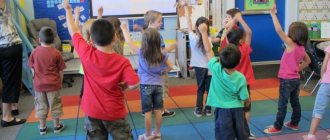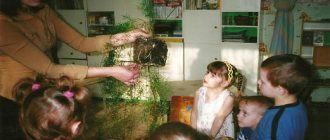Directions of moral development of preschool children
Definition 1
Moral development is the formation in a person of basic moral properties, a meaningful perception of his own personality and its place in the social environment, an understanding of his purpose and the need for continuous improvement of his personality.
Moral development is carried out in the course of moral education.
Moral education is the individual’s assimilation of the fundamentals of morality, the development of moral guidelines for behavior, the assimilation of the fundamentals of the moral functioning of society and the behavioral habits inherent in it.
Moral education is based on moral norms and principles of social behavior. It reflects the continuity of generations and the transfer of social experience.
Are you an expert in this subject area? We invite you to become the author of the Directory Working Conditions
Figure 1. Moral education. Author24 - online exchange of student work
If moral norms are a social category, i.e. they reflect the requirements of society for the behavior of an individual, his compliance with the norms of social interaction, then morality is an internal category, i.e. it is an internal regulator of individual behavior. The moral behavior of an individual in a social environment and its overall development depend on how developed this regulator is.
Moral education begins from an early age of a child. This is relevant because the behavioral habits formed in preschool age become stable foundations of human behavior throughout his life.
Finished works on a similar topic
Course work Moral education of preschool children 480 ₽ Abstract Moral education of preschool children 280 ₽ Test work Moral education of preschool children 210 ₽
Receive completed work or specialist advice on your educational project Find out the cost
The moral education of preschool children is aimed at the formation of an original personality with the skills of social interaction and self-control of behavior. The child must learn to control his actions and actions, express opinions, take into account the needs and interests of another person, develop adequate self-esteem and express his opinions and views, as well as constructively defend his interests in society.
The moral development of a preschooler is focused on the formation of his moral character. The main directions of moral development of a preschooler are:
- Formation of the pupil’s personal properties. It is necessary to create conditions for the disclosure of the natural inclinations of the individual and the disclosure of his potential.
- Moral development of personality. Here, the moral experience of a preschooler’s life is formed, and he masters the experience of social behavior and interaction.
- Developing an adequate attitude towards others: respect for other people’s opinions and points of view, acceptance of someone else’s point of view, different from one’s own, as correct, equality and equivalence of all participants in the social sphere of activity.
- Patriotic education. It is focused on the formation of civic qualities of an individual: love for the Motherland, respect for the customs and traditions of one’s people, awareness of one’s belonging to a particular culture.
- Mastering ethical standards of behavior. They reflect the values of the social environment and the rules of behavior in society, which are unspoken. They are based on the relationship between the interests of the individual and society.
In preschool age, the foundations of moral judgments and assessments are developed. The child comprehends them and learns to apply them in practical activities. In order for a child’s behavior to be formed on the basis of his conditioning by moral norms, it is necessary to organize a system of moral education that takes into account the age-related characteristics of the development of preschoolers and focuses on the social development of the pupil’s personality and his comprehensive humanistic development.
Basic theories of moral development in the family
1. Jean Piaget's theory of moral development
According to the Swiss psychologist J. Piaget, who purposefully studied the characteristics of child development, there are two periods of moral development of children in the family.
- The first period lasts from birth to seven years. It's called heteronomy. Characterized by the imposition of moral principles on a child.
- The second period is after seven years, called autonomy.
J. Piaget believed that cognitive abilities influence the development of morality in a child. Therefore, in his works he presented a list of age stages, each of which is characterized by the formation of morality. Let's look at the stages in detail.

Sensorimotor stage (up to 2 years):
- the development of motor skills is the ability through which understanding of the world around us occurs;
- the child learns about the world through physical interaction: observes objects, takes them in his hands, examines them closely;
- the baby has an awareness of the “permanence of objects,” in other words, that objects exist even in those moments when he does not visually see, hear, or touch them.
Tasks of moral education of preschool children
The moral education of preschool children is focused on developing their moral feelings, ideas and guidelines for social activity, as well as behavioral habits and motives for social activity.
The moral education of preschool children is focused on solving two groups of problems:
- Tasks for developing a mechanism for the moral development of a child. This group of tasks is permanent and sustainable. The mechanism of moral development is associated with the choice of forms, methods and technologies for organizing educational activities, aimed at developing moral ideals in students that correspond to a specific stage of socio-economic development of society.
- Tasks to develop certain qualities and social skills in an individual. These tasks reflect the need to achieve a certain level of development of society and meet its needs. At every historical stage in the development of society, it requires people endowed with certain qualities. Therefore, the tasks of this group change in accordance with the dynamics of the development of the social environment.
Moral education of preschoolers is focused on:
- Education of the fundamentals of cultural behavior and cultural interaction in the social environment;
- Developing collective interaction skills;
- Education of the fundamentals of humanism and humane qualities of the individual;
- Fostering hard work;
- Nurturing patriotic qualities.
The main rules of moral development in the family
The correct moral development of children in the family must go through three stages. Only in this way will a small person grow into a strong personality, immune to negative influences from the outside.
- The first level is motivation. It is important to create conditions so that the child wants to develop, strives to learn the norms and rules of morality.
- The second level is emotional-sensual. This is the correct education of emotions and sensations. Emotions are associated with feelings such as pity, compassion, empathy, and responsiveness. Here we cannot do without the personal example of adults. Moral teaching may not be enough. You can cultivate feelings only through support, and not through punishment.
- The third stage is rational. A growing person already has certain knowledge regarding norms of behavior and moral principles; he learns to distinguish between immoral and moral behavior.
Factors of moral development
Moral development is not subject to a system of external “moral instructions.” Even if we have a clear algorithm, it can be difficult to apply it, because various factors, primarily interpersonal ones, interfere with it. Numerous communications and interactions make it difficult for us to model what is Good and what is Evil. In such a situation, interpersonal communications can be considered as a necessary condition for the formation of moral assessments.
What factors influence a child's moral development?
Relationship system
The main place in it is occupied by parent-child relationships. The system is built depending on how the relationship between the child and the parent develops from early childhood. Nowadays, parents begin to love their children more and punish harshly less often, and this is a clearly positive trend. But at the same time, we often go to the other extreme, when love begins to be understood as permissiveness, connivance, total freedom. This is a dangerous path, since regulatory processes are established already in infancy. A baby clutching its grandmother's hair cannot be explained why it is bad; but to make it clear that this cannot be done is possible and necessary.
Experience with peers
Interaction with “people like me” is a school of real moral choice. If adults create rules, some ideal model, teach how it should be, then in communication with peers the child practices the acquired knowledge in practice. This is how real relationships are formed. In close relationships with peers, children face complex tasks that sometimes cannot even be predicted in advance.
Internal factors, personal prerequisites
Sometimes an anxious child will be more moral in behavior than a non-anxious child, but not because he has some deep principles and has reached the highest level of moral development, but because he has remained at the first level and experiences strong fear of punishment. If another, more powerful fear pushes him towards less moral behavior, his position will change.
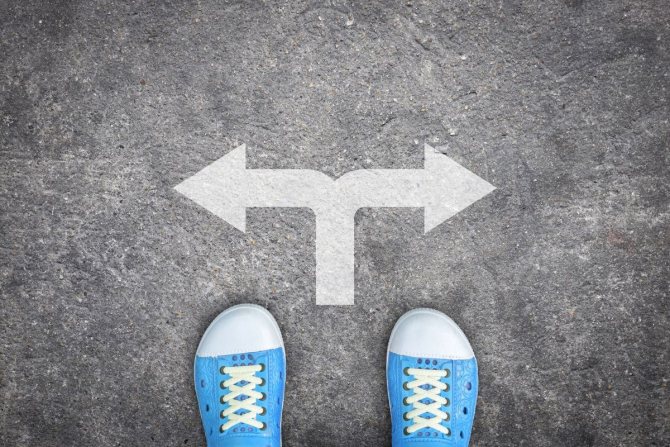
External factors
External factors are the influences of the environment or the life experiences that a child has to face as he develops. In our time, a dual picture has emerged. On the one hand, the quality of life and the quality of childhood have improved significantly, but on the other hand, modern children clearly lack difficulties. Of course, we are talking about difficulties that are feasible, according to age - about such difficulties that a child can cope with and come out of the situation with the thought “I’m great!” Modern children have extremely poor experience of this kind; they rarely face situations of serious moral choice.
Stages of Moral Development
The stage of moral development is determined by the decision we make in a situation of moral choice. Moreover, the decision is free, when no one puts pressure or coerces, and the decision does not bring obvious benefits. In this case, the choice is made on the basis of moral principles.
Lawrence Kohlberg's scale helps to understand what stage of moral development a person is at.
- The morality of obedience (do the right thing to avoid punishment) and the morality of benefit (you to me, I to you).
- Good boy morality (doing the right thing for approval) and maintaining order and social justice (everything must be orderly and organized according to rules, otherwise society will fall apart).
- Expediency and usefulness (justification in each specific case of the logic of choice).
- Finally, the rarest and highest level of moral development is internal moral principles: in this case, a person develops his own moral position, which is justified, appropriated and unshakable.

